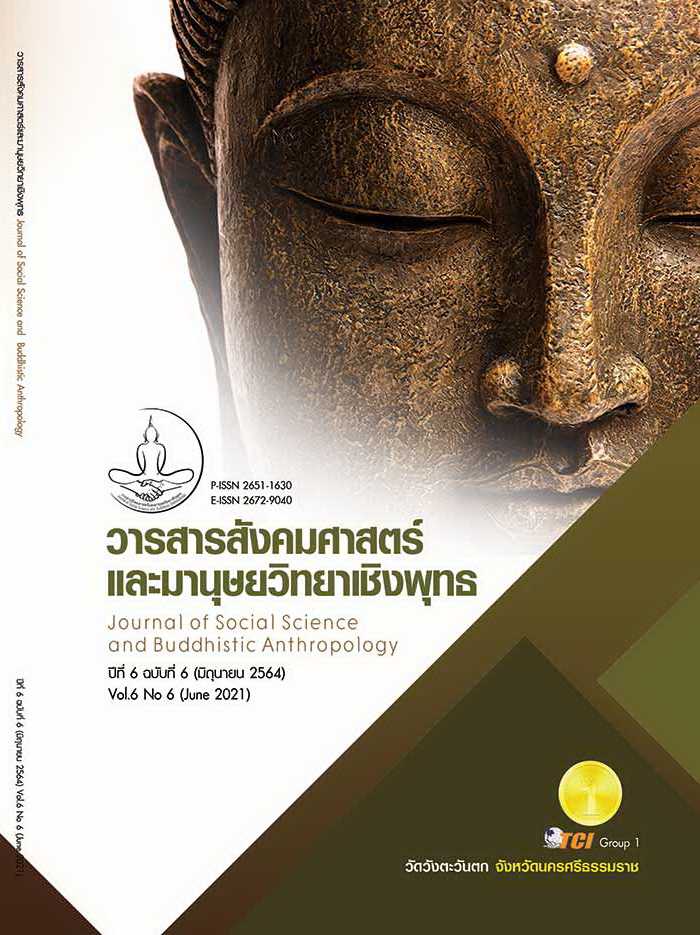UNIVERSITY MANAGEMENT STRATEGIES ACCORDING TO THE CONCEPT OF EDUCATION FOR SUSTAINABLE DEVELOPMENT
Keywords:
University Management Strategies, Strategy Development, Sustainable DevelopmentAbstract
The objective of this research article were to 1) to study the current and desirable conditions of the university management strategies according to the concepts of education for sustainable development and 2) to develop university management strategies according to the concepts of education for sustainable development in the areas of economy, society, environment and systematic concepts. This research is mixed method qualitative and quantitative research. The samples used in this study were 243 personnel from public and private universities all over the country. The tools used for data collection in this study were a conceptual framework assessment, a set of research questionnaires and semi - structured interviews. The data were analyzed by descriptive statistics and content analysis. Results revealed that the current conditions of the university management strategies ranked in a descending order were the curriculum development, the teaching and learning management and the measurement and evaluation of education. Generally speaking, most of the components in each aspect were rated in mostly performed. However, the desirable conditions for the future ranked also in a descending order were the curriculum development, the measurement and evaluation of education and the teaching and learning management. On average, most of their components were expected to be performed the most. Finally, it was found 3 important strategies for university management along the concepts of education for sustainable development. They were: 1) reforming the integrated curriculum design towards sustainable development 2) enhancing the quality of educational measurement and evaluation that promote skills and concept of education management for sustainable development 3) transforming and integrating teaching and learning management into skills and concepts of education management for sustainable development.
References
กระทรวงอุดมศึกษา วิทยาศาสตร์ วิจัยและนวัตกรรม. (2563). ด้านการอุดมศึกษาเพื่อผลิตและพัฒนากำลังคนของประเทศ พ.ศ. 2564 - 2570. เรียกใช้เมื่อ 20 สิงหาคม 2563 จาก http://www.mua.go.th/users/bpp/main/download/plan/Full%20HigherEdu64%20-%2070.pdf
กองบริหารงานวิจัยและประกันคุณภาพการศึกษา. (2560). พิมพ์เขียว Thailand 4.0 โมเดลขับเคลื่อนประเทศไทยสู่ความมั่งคั่ง มั่นคง และยั่งยืน. เรียกใช้เมื่อ 20 สิงหาคม 2563 จาก https://www.nstda.or.th/th/nstda-doc-archives/thailand-40/11625-blueprint-thailand-4
กาญจนา เงารังสี. (2559). การศึกษากับการพัฒนาที่ยั่งยืน. วารสารสมาคมนักวิจัย สาขามนุษยศาสตร์และสังคมศาสตร์, 21(2), 13-18.
จิรายุ อิศรางกูร ณ อยุธยา. (2561). "พอเพียงเพื่อยั่งยืน" บริหารการพัฒนาตามปรัชญาของเศรษฐกิจพอเพียง. เรียกใช้เมื่อ 15 พฤศจิกายน 2563 จาก http://www.tsdf. nida.ac.th/th/
เถกิง วงศ์ศิริโชติ. (2563). ม.อ. ร่วมกับ SUN Thailand จัดประชุมเครือข่ายมหาวิทยาลัยยั่งยืนที่ภูเก็ต. เรียกใช้เมื่อ 30 พฤศจิกายน 2563 จาก https://www.phuket.psu.ac.th/ 19268/
นิจวรรณ วีรวัฒโนดม และนงณภัทร รุ่งเนย. (2555). การบริหารสถาบันอุดมศึกษาตามหลักปรัชญาเศรษฐกิจพอเพียง. วารสารวิทยาลัยพยาบาลพระปกเกล้า จันทบุรี, 23(2), 65-72.
ปิยะพันธ์ ทยานิธิ. (2559). คอลัมน์ คิดเป็นเห็นต่าง: วัฒนธรรม แหล่งบ่มเพาะทุจริต. เรียกใช้เมื่อ 20 สิงหาคม 2563 จาก http://www.thai-iod.com/imgUpload/วัฒนธรรม%20แหล่งบ่มเพาะทุจริต%20(จบ).pdf
พรชุลี อาชวอำรุง. (2546). การบริหารสถาบันอุดมศึกษา: หลักสูตรการฝึกอบรมเพื่อนักวางแผนและผู้จัดการสถาบันอุดมศึกษา. กรุงเทพมหานคร: สำนักพิมพ์แห่งจุฬาลงกรณ์มหาวิทยาลัย.
ไพฑูรย์ สินลารัตน์ และคณะ. (2555). กรอบคุณวุฒิของประเทศไทย. กรุงเทพมหานคร: โรงพิมพ์แห่งจุฬาลงกรณ์มหาวิทยาลัย.
ภาสกร เรืองรอง และคณะ. (2557). เทคโนโลยีการศึกษากับครูไทยในศตวรรษที่ 21. วารสารปัญญาภิวัฒน์, 5(5), 195-205.
ยุพา เวียงกมล อัดโดดดร. (2554). กลยุทธ์การบริหารวิชาการของสถานศึกษาขั้นพื้นฐานเพื่อส่งเสริมการพัฒนาที่ยั่งยืน. วารสารครุศาสตร์, 40(3), 38-47.
ราชกิจจานุเบกษา. (2554). มาตรฐานสถาบันอุดมศึกษา พ.ศ. 2554. เรียกใช้เมื่อ 1 ธันวาคม 2563 จาก http://www.bhes.mua.go.th/front_home/Ministry_sAnnouncement2008.pdf
วราภรณ์ เชื้ออินทร์. (2555). แนวคิดการจัดการการศึกษาหลังปริญญาเพื่อการพัฒนาอย่างยั่งยืน. ศรีนครินทร์เวชสาร, 27(1), 77-93.
Greig, S. et al. (1987). Earthrights. Education as if the Planet Really Mattered. Godalming: World Wildlife Fund.
Krejcie, R. V. & Morgan, D. W. (1970). Determining Sample Size for Research Activities. Educational and Psychological Measurement, 30(3), 607-610.
Ontario Learning for Sustainability Partnership (OLSP). (1996). Learning for Sustainability: Essential Outcomes and Classroom Learning Strategies. Toronto: OLSP.
UNESCO. (1997). Educating for a Sustainable Future: A Transdisciplinary Vision for Concerted Action. Paris: UNESCO.
UNESCO. (2005). Working Paper: Asia-Pacific Regional Strategy for Education for Sustainable Development. (2nd ed). Bangkok: UNESCO Bangkok.
UNESCO. (2006). Teacher and Educational Quality. Monitoring Global needs for 2015. Montreal: Statistical Study. Geneva: UNESCO.









